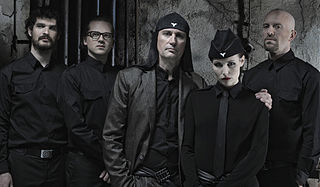
Laibach is a Slovenian avant-garde music group associated with the industrial, martial and neo-classical genres. Formed in the mining town of Trbovlje in 1980, Laibach represents the musical wing of the Neue Slowenische Kunst (NSK) collective, a group which Laibach helped found in 1984. "Laibach" is the German historical name for the Slovenian capital Ljubljana, itself an oblique reference to the Nazi occupation of Slovenia in World War II.

Opus Dei is the third studio album by a Slovenian band Laibach, released in 1987. It features "Geburt einer Nation", a German cover of Queen's "One Vision", and two reworkings of the Austrian band Opus' sole international hit single "Live Is Life". The Opus song became the German language "Leben heißt Leben" and the English language "Opus Dei". "The Great Seal" is the national anthem of the NSK State, the lyrics taken from Churchill's "We shall fight on the beaches" speech. A new arrangement of the song appears on Laibach's album Volk, with the title "NSK". On Volk, the song is credited to Laibach and Slavko Avsenik, Jr.

Kapital (Capital) is the fourth studio album by Laibach. It includes tracks such as "Wirtschaft ist tot". Unusually, the LP, CD and cassette releases each contain different versions of every song. Track "Steel Trust" by Laibach sub-group Germania, appears only on LP and cassette. Album was produced by Holger Hiller, Julian Briottet, Laibach, Paul Kendall, Russell Haswell and Daniel Miller.

NATO, released on 10 October 1994, is a studio album by Slovenian industrial group Laibach, named after the North Atlantic Treaty Organization. It is a selection of cover versions with the theme of war.
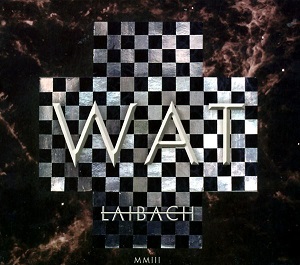
WAT is the sixth studio album by Slovenian music group Laibach, released September 8, 2003.

Rekapitulacija 1980–1984 is a retrospective album by the Slovenian industrial group Laibach. It was first released as a double LP boxset in 1985, and re-released on CD in 1987.
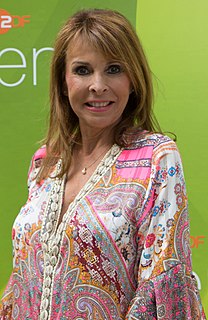
Ireen Sheer is a German-British pop singer. She had a top five hit on the German singles chart with "Goodbye Mama" in 1973. She went on to finish fourth at the Eurovision Song Contest 1974 representing Luxembourg, sixth at the Eurovision Song Contest 1978 representing Germany, and 13th for Luxembourg in 1985.
Die Flippers were a German Schlager group formed in 1964. They were one of the most successful Schlager groups of all time, and have been constantly recording and releasing new music since their self-titled debut album was released in 1970. They have released 45 albums, 5 of which have gone platinum, 24 gold. They have won a Goldene Stimmgabel in 1988, 1991, 1994, 1995, 1996, 1998, 1999, 2000, 2002, 2003 and 2004.

Volk Volk Tour London CC Club 16.04.2007 is a special limited edition 2 CD live album by the Slovenian industrial/techno music group Laibach. The album is a full recording of the band's live show in London at CC Club on 16 April 2007. CD1 contains the first part of the concert with songs from Laibach's album Volk. CD2 contains a mix of other songs, mostly from the album WAT.

Die Kassierer, also Die mächtigen Kassierer, are a satirical punk band from Bochum-Wattenscheid, Germany. The group was founded in 1985 by Wolfgang Wendland (vocals), Nikolai Sonnenscheiße (guitar), Volker Kampfgarten and Mitch Maestro.
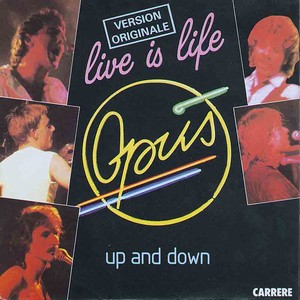
"Live Is Life" is a song originally recorded in 1984 by Austrian band Opus. It was a European number-one hit in the summer of 1985. The single also reached number one in Canada and was a top 40 hit in the US in 1986. It has been covered by many artists throughout the years.
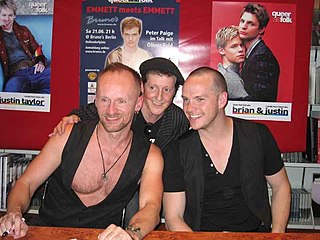
Santiago Ziesmer is a Spanish-born German actor and voice actor.

Geier Sturzflug was a German musical group of the Neue Deutsche Welle genre, created in 1979, and probably best known for their hits "Bruttosozialprodukt", "Pure Lust am Leben," "Einsamkeit," and "Besuchen Sie Europa." The first of these was number one in Germany for the entire month of May 1983. Stylistically they combine music styles of rock, pop, ska, and jazz with cynical lyrics. Their name translates to "Vulture Nosedive" in English. Band members were:

Nikolaus Herman was a German Lutheran cantor and teacher, creating numerous Protestant hymns. Some of them are contained in hymnals in several languages.
VIVA was an Austrian free-to-air television channel launched 2012 as the localised feed of VIVA Germany. In June 2018, Viacom announced that it will shut down all Viva operations worldwide by 31 December 2018.

Katy Nina Karrenbauer is a German actress, dubbing actress, singer, and author. She is known for her role as Christine Walter in the drama series Hinter Gittern – Der Frauenknast.

Werner Schneyder was an Austrian kabarett performer, journalist, writer, actor, stage director, television presenter and sports reporter. He performed political kabarett with Dieter Hildebrandt from 1974 to 1982, with an extra program presented in Leipzig, then in the GDR, in 1985. He moderated das aktuelle sportstudio on ZDF from 1975, and a series about boxing for RTL from 1992 to 1999. He described himself as a Universaldilettant.

"Mit Ernst, o Menschenkinder" is an Advent hymn by Valentin Thilo. It partly paraphrases the call to penitence by John the Baptist. The text was first published in 1642 in the collection Preußische Festlieder. The different melody that later became popular dates back to 1557.
















